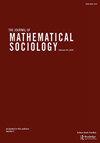Dissecting income segregation: Impacts of concentrated affluence on segregation of poverty
IF 1.3
4区 社会学
Q3 MATHEMATICS, INTERDISCIPLINARY APPLICATIONS
引用次数: 3
Abstract
ABSTRACT This article investigates how income inequality shapes residential segregation by income. Using agent-based modeling, it develops a residential preferences model that is capable of generating results mimicking empirical income segregation patterns. Simulation analysis shows how varying income inequality produces differential residential mobility outcomes that alter income segregation profiles. The model is used to capture the distinct impacts of households’ moves into richer or poorer neighborhoods, and how these impacts are further differentiated with respect to the moving household’s income. The article demonstrates how aggregating such diverse outcomes of micro-level interactions at a meso-level can help us to better understand the changes in macro-level income segregation patterns. Analyzing residential mobility patterns carefully, the article suggests that i) segregation of affluence and of poverty can trigger each other via initiating cascades of residential mobility and housing prices, and ii) increasing income inequality can disrupt housing market and lead to shortages in affordable housing, which can yield high residential instability and eviction rates among the poorest stratum.剖析收入隔离:财富集中对贫困隔离的影响
摘要本文研究了收入不平等如何通过收入影响居住隔离。使用基于主体的建模,它开发了一个住宅偏好模型,能够产生模拟经验收入隔离模式的结果。模拟分析显示了不同的收入不平等如何产生不同的居住流动性结果,从而改变了收入隔离概况。该模型用于捕捉家庭迁入较富裕或较贫穷社区的不同影响,以及这些影响如何根据迁入家庭的收入进一步区分。本文展示了如何在中观水平上汇总微观层面相互作用的各种结果,从而帮助我们更好地理解宏观层面收入隔离模式的变化。通过仔细分析住宅流动模式,本文认为:1)富裕和贫困的隔离可以通过引发住宅流动和房价的级联而相互触发;2)收入不平等的加剧可能会扰乱住房市场,导致经济适用房的短缺,从而导致住宅的高度不稳定和最贫困阶层的驱逐率。
本文章由计算机程序翻译,如有差异,请以英文原文为准。
求助全文
约1分钟内获得全文
求助全文
来源期刊

Journal of Mathematical Sociology
数学-数学跨学科应用
CiteScore
2.90
自引率
10.00%
发文量
5
审稿时长
>12 weeks
期刊介绍:
The goal of the Journal of Mathematical Sociology is to publish models and mathematical techniques that would likely be useful to professional sociologists. The Journal also welcomes papers of mutual interest to social scientists and other social and behavioral scientists, as well as papers by non-social scientists that may encourage fruitful connections between sociology and other disciplines. Reviews of new or developing areas of mathematics and mathematical modeling that may have significant applications in sociology will also be considered.
The Journal of Mathematical Sociology is published in association with the International Network for Social Network Analysis, the Japanese Association for Mathematical Sociology, the Mathematical Sociology Section of the American Sociological Association, and the Methodology Section of the American Sociological Association.
 求助内容:
求助内容: 应助结果提醒方式:
应助结果提醒方式:


